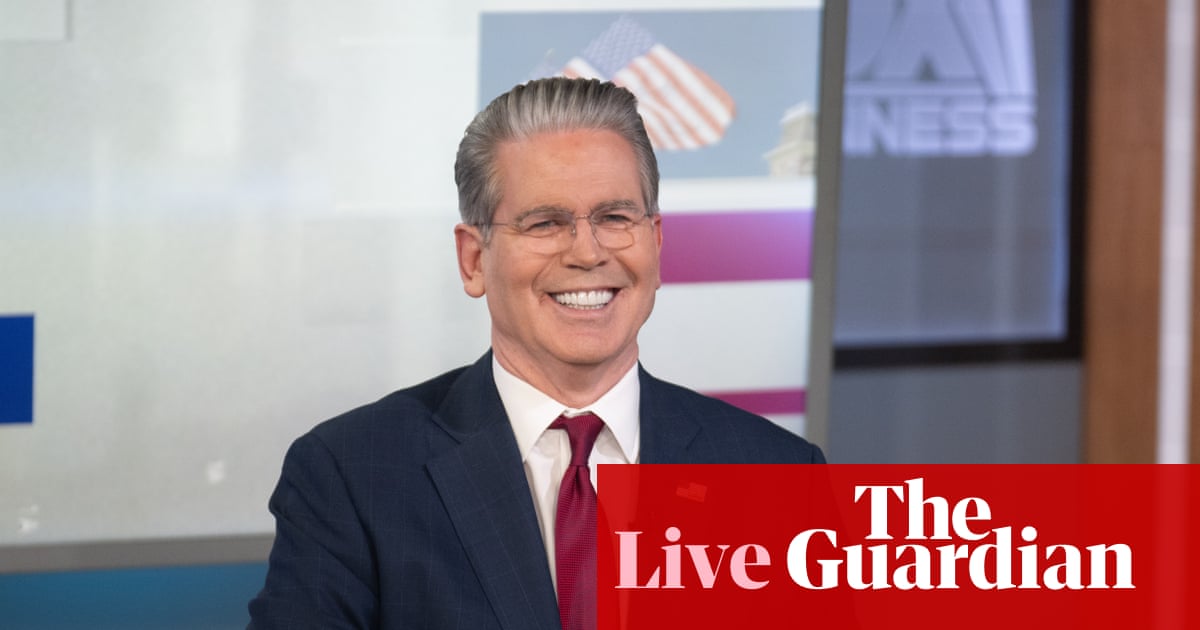Key events
Show key events only
Please turn on JavaScript to use this feature
Evergrande shares to be delisted, marking end of era
The troubled Chinese property developer Evergrande said its Hong Kong shares will be delisted, marking the end of an era for the once biggest Chinese developer whose demise is now synonymous with the country’s property bust.
The Guangzhou-based company said the Hong Kong stock exchange has decided to cancel its listing, according to a filing to the bourse on Tuesday. The shares will be removed on 25 August and the company will not apply for a review of the decision.
The property crisis dragged down China’s economic growth. Evergrande’s demise began with its first default on a dollar bond in December 2021. It was once the country’s largest developer by sales, worth more than $50bn at its peak in 2017.
Since then, it has become the world’s most indebted property developer, with more than $300bn in debts. It is one of dozens of Chinese companies that have collapsed since 2020 under official pressure to rein in excessive borrowing that the ruling Communist party views as a threat to the economy.
A man walks past the entrance of the headquarters of China Evergrande Group in Hong Kong, in 2021. Photograph: Vincent Yu/APShare
Donald Trump has also been vocal, hitting out at Goldman Sachs CEO David Solomon, saying the bank had been wrong to predict tariffs would hurt the economy and questioning whether Solomon should lead the Wall Street institution.
In a post on Truth Social, Trump said it was mostly foreign companies and governments absorbing the cost of his tariffs.
But David Solomon and Goldman Sachs refuse to give credit where credit is due. They made a bad prediction…on both the Market repercussion and the Tariffs themselves.
Trump said Solomon should maybe focus on being a DJ, a hobby Solomon abandoned some time ago, “and not bother running a major Financial Institution”.
The bank CEO is the latest corporate boss to become the target of Trump’s ire.
David Solomon, CEO of Goldman Sachs, speaks during the Australian Financial Review Business Summit in Sydney, Australia, March 4, 2025. Photograph: Christine Chen/ReutersShareIntroduction: US treasury secretary Scott Bessent calls for half-point interest rate cut at next Fed meeting
Good morning, and welcome to our rolling coverage of business, the financial markets and the world economy.
Global stocks rallied and US markets hit new all-time peaks after US inflation defied expectations of an uptick and stayed steady last month. The figure eased concerns that Donald Trump’s tariff hikes would push up imported goods inflation.
US treasury secretary Scott Bessent is now calling for a half-point interest rate cut in September.
The inflation data was a mixed bag – headline inflation held at 2.7% but core inflation, which strips out energy and food, was higher than expected at 3.1%. Even so, investors’ bets on a rate cut in September increased, as goods prices were more subdued while services inflation picked up.
Bessent said in an interview on Fox Business yesterday:
The real thing now to think about is should we get a 50 basis-point rate cut in September.
He said that two days after the US Federal Reserve left rates unchanged on 30 July, revised data showed weaker job growth for May and June than official figures had previously indicated, suggesting the Fed “could have been cutting in June, July”.
“Cut that rate!” summed up Ipek Ozkardeskaya, senior analyst at Swissquote Bank.
Yesterday, US inflation data was mixed, but the market reaction was not. Normally, core inflation is the measure the Federal Reserve (Fed) focuses on when deciding monetary policy. In that context, the market could have reacted by scaling back expectations of a September rate cut.
But no — investors instead increased September cut expectations, thinking that imported goods inflation remained lower than feared as companies continued to absorb tariff costs. As a result, the US 2-year yield fell after the data release, the probability of a September cut jumped to 94% from 80% beforehand, and the US dollar slipped back.
The dollar has slipped a further 0.1% against a basket of other major currencies.
Investors cheered the news, driving the S&P 500 and the tech-heavy Nasdaq to new all-time highs, up 1.1% and 1.4% respectively. Japan’s Nikkei also closed at fresh record high, 1.3% higher on the day, while Hong Kong’s Hang Seng jumped by 2.4%.
Inflation in Germany eased to 1.8% in July from 2% in June, the federal statistics office confirmed this morning.
The yield on 30-year German government bonds are down today, after hitting a 14-year high yesterday. Analysts pointed to Dutch pension reforms, which are expected to reduce demand for long-dated bonds, and expectations for a big increase in German government spending as the main reasons behind Tuesday’s sell-off.
Markets are turning their attention to the summit in Alaska between Trump and Vladimir Putin on Friday to discuss ending Russia’s war in Ukraine.
The Agenda
9am BST: IEA Oil market report
Updated at 03.22 EDT
